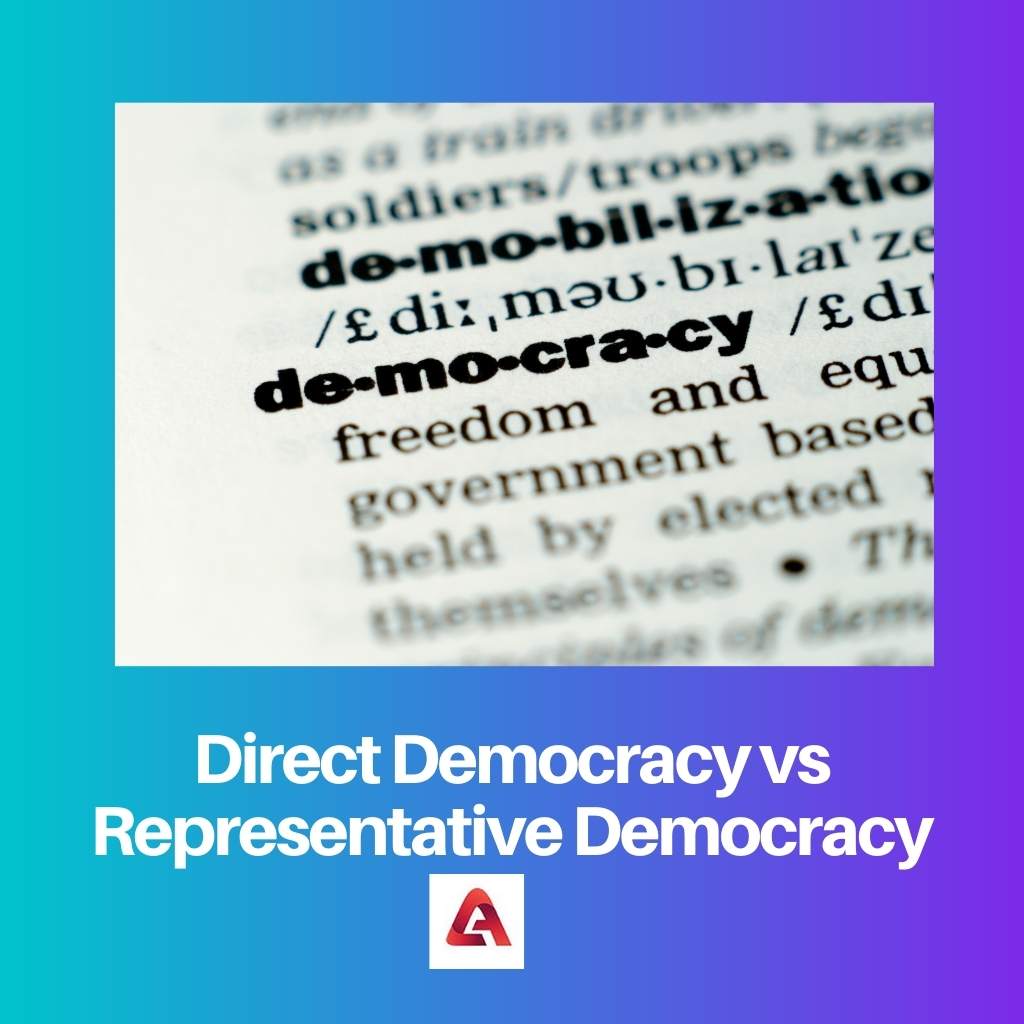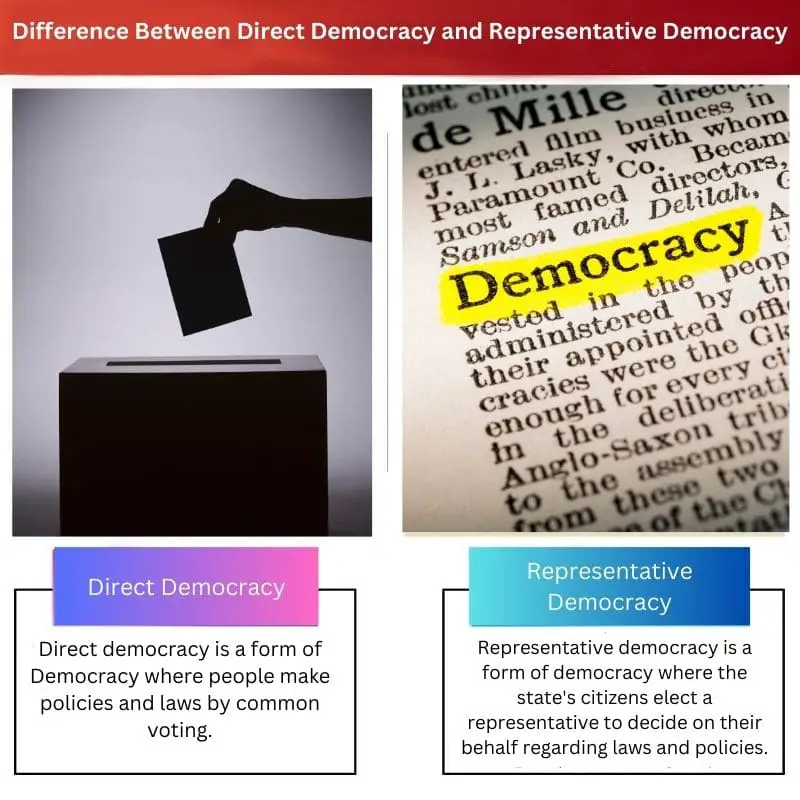Democracy is a type of government in a country, which means that in that specific country, the people of the country decide to govern them and who should be selected accordingly to the people.
Key Takeaways
- In a Direct Democracy, citizens directly participate in the decision-making process, whereas in a Representative Democracy, citizens elect officials to represent their interests and make decisions on their behalf.
- Direct Democracy is used in small communities and for local issues, while Representative Democracy is used in larger societies and for national issues.
- Direct Democracy can lead to slower decision-making processes and possible logistical issues, whereas Representative Democracy can potentially result in representatives acting against their constituents’ interests.
Direct Democracy vs Representative Democracy
The difference between direct democracy and representative democracy is that indirect democracy, the laws and policies are prepared by the joint vote of the society of the people related to governing the society. On the other hand, representative democracy states laws and policies by the representatives who the ordinary people in the community choose.

The other name of direct democracy is known as a pure democracy, where there is the direct participation of citizens in governing the country.
Representative democracy is also known as indirect democracy, in which the people set up a vote for electing a representative to take all important decisions regarding the laws and policies for the betterment of the state.
Comparison Table
| Parameters of Comparison | Direct Democracy | Representative Democracy |
|---|---|---|
| Meaning | Direct democracy is a form of Democracy where people make policies and laws by common voting. | Representative democracy is a form of democracy where the state’s citizens elect a representative to decide on their behalf regarding laws and policies. |
| Transparency | There is complete transparency regarding a country or state following direct democracy. | There is little transparency regarding a country or state following representative democracy. |
| Barriers | There are no intermediates or barriers in a country following direct democracy. | There are intermediates and barriers when a country follows representative democracy. |
| Efficiency | A country or state following direct democracy is said to be less efficient. | A country or state following representative democracy is said to be more efficient. |
| Examples | Athens in ancient times and Switzerland are some examples where direct democracy is followed. | India, France, the US, and the UK are some examples where representative democracy is followed. |
What is Direct Democracy?
The other name of direct democracy is known as a pure democracy, where there is the direct participation of citizens in governing the country.
There are equal rights for all citizens to make decisions on bills, votes, etc., regarding matters regarding the betterment of the state of the people.
Of all the countries in the world, Switzerland is one of the leading countries following this type of democracy following the same actions.

What is Representative Democracy?
Representative democracy is also known as indirect democracy, in which the people set up a vote for electing a representative to take all important decisions regarding the laws and policies for the betterment of the state.
In this form of democracy, there is no direct involvement of citizens in the decision-making process in the state. Instead, they vote for a group of representatives to do all the decision-making for their state.
The main advantage is that this dares to empower people to elect representatives for the taking of policies and laws. Still, the main advantage of this type of democracy is that sometimes, the elected representatives may not always go according to the people’s will and sometimes misuse their power and position.

Main Differences Between Direct Democracy and Representative Democracy
- A country or state following direct democracy is said to be less efficient. On the other hand, a country or state following representative democracy is said to be more efficient.
- Athens in ancient times and Switzerland are some examples where direct democracy is followed. On the other hand, India, France, the US, and the UK are some examples where representative democracy is followed.

- https://www.tandfonline.com/doi/abs/10.1080/00344890600583685
- https://www.sciencedirect.com/science/article/pii/0261379489900012
Last Updated : 11 June, 2023


Emma Smith holds an MA degree in English from Irvine Valley College. She has been a Journalist since 2002, writing articles on the English language, Sports, and Law. Read more about me on her bio page.

Direct democracy offers inclusivity, but its potential inefficiency is concerning. Representative democracy can indeed act more efficiently but poses challenges related to the accountability of elected officials.
Absolutely, as the saying goes, ‘Power tends to corrupt and absolute power corrupts absolutely.’
Direct democracy gives society the control and responsibility to make their own decisions which, in theory, is great. However, it can make the decision-making process arduous and sometimes unproductive. Representative democracy offers a fast decision-making process, but representatives may not always act in the interest of the people. So, what’s the perfect system?
Can’t representative democracy be improved by increasing the accountability and transparency of elected officials?
The perfect system may not exist at all. It’s the balance between participation and efficiency that poses the challenge.
Direct democracy is a noble concept, but it indeed has some limitations. Representative democracy is a more effective choice for countries with larger populations. Still, issues emerge when representatives swerve away from the interests of the people.
Direct democracy seems unfeasible for large societies. Representative democracy seems better, but it requires solid checks and balances to ensure that representatives serve the public good.
I appreciate the detailed comparison provided in this post. It gives a clear understanding of the key aspects of both direct democracy and representative democracy.
The comparison is definitely helpful. There’s no one-size-fits-all approach – each system has its pros and cons based on the region and its circumstances.